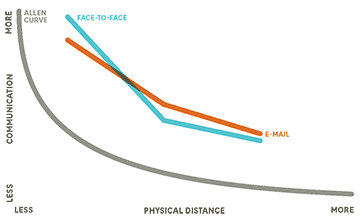How to love the office
ALSO: Iconic UK firm is tracking whether workers are at their computers

How should any firm think about using their office space?
On the link above Tim Harford takes a look at the evolution of the office to where it is today.
It’s a fascinating history lesson about the ground-breaking work of Mad Man Jay Chiat who created a prototype hot-desking environment in the 1990s. In an era before personal laptops and mobile phones employees would have to sign-out equipment on arrival in the office - as an economy there weren’t enough of these things to go round which added to the sense of hellish dissatisfaction with the experimental regimen.
Along the way Harford reminds us of the Allen Curve, namely the phenomenon observed by MIT Professor Thomas Allen that we communicate less with other colleagues the further away they sit:
“we are four times as likely to communicate regularly with someone sitting six feet away from us as with someone 60 feet away, and we almost never communicate with colleagues on separate floors or in separate buildings”
The most compelling detail on the programme is research into what office environment workers most enjoy which found that employees are ‘happiest and most productive when they control the look and style of their work areas’ but are driven to distraction when they feel they are powerless over their surroundings.
It makes for a compelling listen for any of us trying to get the best out of our workspaces. I’ve heard several companies who have a system where teams have specific zones (or neighbourhoods) of their office, Harford’s show gives us a perspective on how those innovations might be best shaped.
Everything is back except offices & transport
With the dazzling box office performances of Avatar 2 and Mario Bros cinema admissions have now returned to pre-pandemic levels. As one commentator says ‘Bottom line: Pretty much everything is back except offices and public transit. It might take more than Super Mario to bring back a five-day week in the office.
Nick Bloom looked at the impact of WFH on mentoring - both being mentored and providing mentoring were a higher priority in the office than when working remotely, He found ‘those who came into work reported spending… as much as 35% to 40% more’ time mentoring. He concludes: “personal interactions among colleagues diminish by a significant amount when someone works from home. That is a cost workers and firms pay in terms of slower on-the-job learning, in exchange for the flexibility and personal autonomy gained when working from home”.
Online bank Monzo asks employees to be working at their computers for 85% of the day - and monitors whether they do so. Interesting scoop by the Telegraph
This Guardian podcast about the cultural problems at business lobbying giants, CBI, is a compelling listen about the challenges of allowing a work hard, play hard culture get out of control (subtext: contemporary work hard play hard cultures seemingly tolerate employees using drugs, and once you’ve turned a blind eye to drugs how can you police other things?)
I had an incredible discussion with a senior leader at a retail business last week. She told me that she was ordering her team to use Chat GPT for every project they were working on. We need to write a buyers’ guide for Product X? Her team got the AI to do the first draft. Interested in ideas for next quarter’s promotions? They gave a strong outline to the computer and got tabulated ideas back. Six months ago I wrote that AI would change work in 2023 and it’s hard to keep track of all the ways that is coming true. If you’re still unsure the New York Times filled in some of the gaps and gave 35 real life applications for AI (including inventing a Suduko-like game)
What happened to the compassion of telling people bad news to their faces? McDonalds asked employees to WFH last month so they could make a group of them redundant remotely
The CEO letter from Amazon boss Andy Jassy explains why face-to-face time is so important to their team: ‘The energy and riffing on one another’s ideas happen more freely, and many of the best Amazon inventions have had their breakthrough moments from people staying behind after a meeting and working through ideas on a whiteboard, or continuing the conversation on the walk back from a meeting, or just popping by a teammate’s office later that day with another thought’







yes - there's more on this coming this week
On McD: Likewise at Meta, there were news this week that the company asked people who could WFH to do so on Wednesday so that people who were laid off earlier that week had "space to process the news". Really, no idea what so say when I read that ...